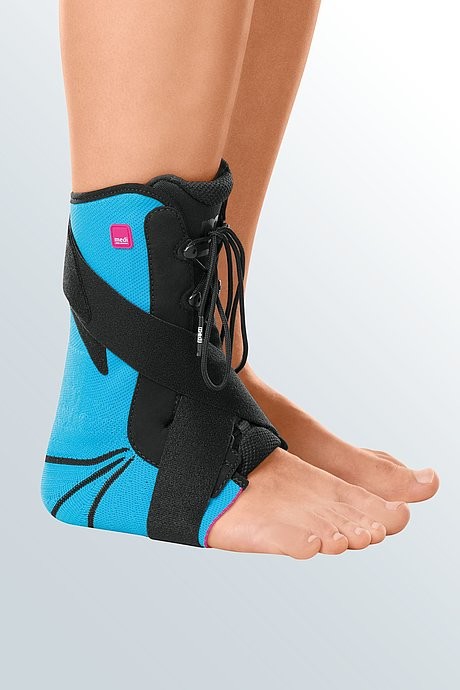
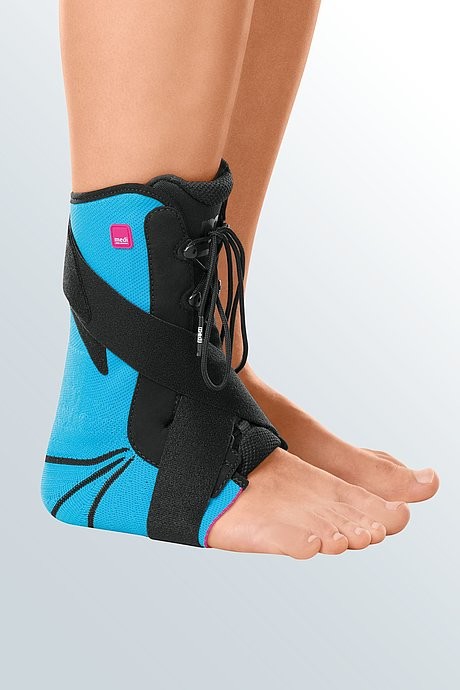
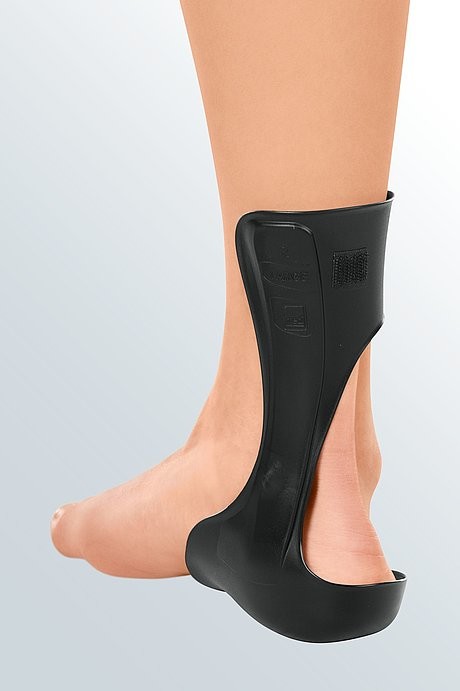
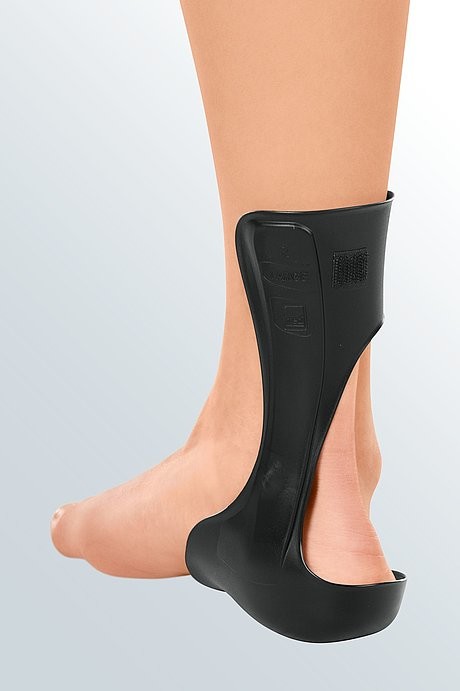
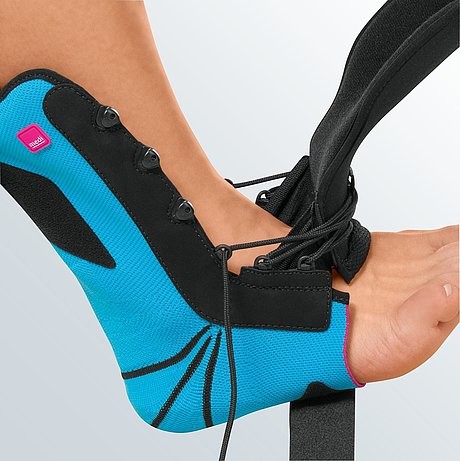
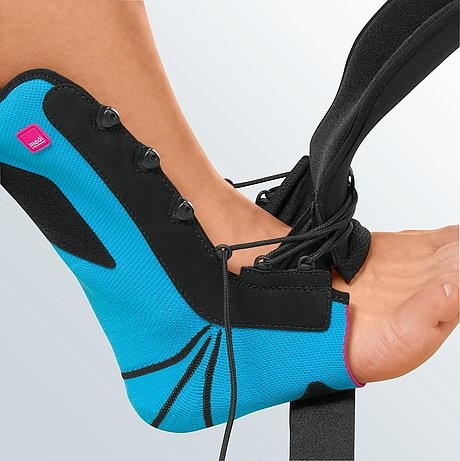
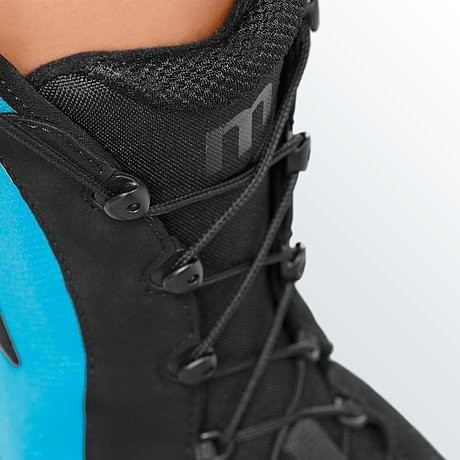
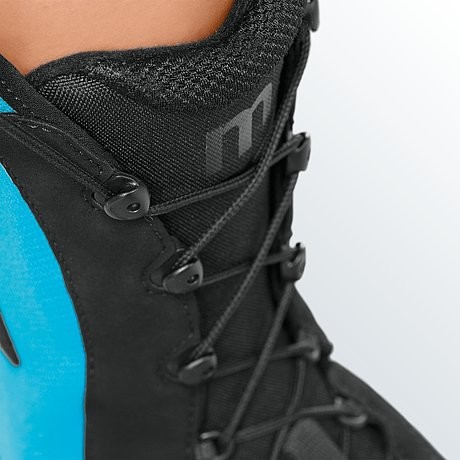








Levamed® stabili-tri®
Modular ankle orthosis
Easy modular design
Wide opening for minimum pain when donning and doffing
Cross-lacing for flexible pressure
3-fold modular orthosis for functional supply of ankle injuries
Levamed stabili-tri is an ankle orthesis made of knitted fabric with stabilisation element and strap system for phased mobilisation. It is exclusively to be used for the orthotic fitting of the ankle joint and only on unbroken skin.


Indications
Ankle sprains (grades 2 to 3)
Chronic instability of the talocrural and subtalar joints
Postoperative care after surgery on the ligamentous apparatus of the ankle joint
Contraindications
Diseases or injuries of the skin in the area of use, especially with inflammatory symptoms (excessive warming, swelling or reddening)
Sensitivity and perfusion disorders of the legs or feet (e.g. in the case of diabetes)
Lymph outflow disorders, as well as unclear swellings of soft tissues, apart from the area of use
Product benefits
Modular design supports functional treatment
Adaptable to the three healing phases - for safe and reliable treatment and mobilisation of the patient
Talus lock tongue reduces anterior talar shift
Medial stabilising element gives support and relieves stresses on the lateral side of the foot
Stabilising strap guides the foot in gentle pronation and supports the healing process
Compressive knit improves proprioception and promotes more rapid absorption of haematomas and oedema

How does it work?/Mode of action
The orthesis produces a stabilisation of the ankle joint, through the interplay of the knitted fabric, a rigid, medially running stabilisation element (plastically formable), the sturdy tongue and the strap system. The limiting of pronation, supination and of plantar flexion, protects the joint against further harm after a trauma. The knitted fabric on its own here produces a massaging effect that promotes the circulation and thus accelerates the decreasing of swellings and effusions. The strap system supports the body‘s own stabilisation and gives additional hold, similar to taping. Due to the fact that it can be downgraded, the Levamed stabili-tri orthesis is suitable for therapy accompaniment adapted to stages. The product can thus be downgraded according to the phase of the healing process and offer more freedom of movement in a controlled way. The orthesis can be worn with or without a stocking, as required.
1. Phase – acute phase (inflammation phase) Immobilisation of the foot is absolutely necessary in order to counteract inflammations and marked swellings on the ankle occurring immediately after the injury. Fully equipped with stabilising element and strap system, this orthesis provides maximum support for relief and thus supports the reduction of swelling and pain.
2. Phase – repair phase (proliferation phase) The mobilisation of the foot can be gradually increased, improving the muscular stabilisation of the ankle joint and assisting further reduction of swelling in the affected structures. By removing the stabilising elements, the ankle joint is given more freedom, permitting controlled movement. The combination of the stiff tongue and webbing continues to provide necessary support. In order not to re-injure structures that have healed during the day, it is however recommended to continue using the stiff element at night as well.
3. Phase - remodulation phase In the final therapy phase, the webbing is removed to allow further freedom of movement. The aim is to continue to get the affected structures used to loads and strengthen them. The stiff tongue and the knitted fabric continue to support the body‘s own joint stabilisation proprioceptively.
Donning/fitting instructions
Putting on the orthesis: Attach the middle of the strap to the front part of the bottom of the foot. Here one should ensure a marked trapezoid shape. This way, the strap end lies on the outer side of the foot and that the point symbols are visible. Now hook and loop fastener-fasten the stabilisation element (thermoplastically formable) into the knitted fabric and make sure that it is fixed to the ground at the two hook and loop fastener points and at the calf brace. Grip the orthesis from above at both sides and secure the stabilising element with the knitted fabric. Ensure that the orthesis is wide open and now pull it onto the foot until the heel lies properly in the shell. When closing the orthesis, please ensure that the tongue is under the knitted fabric, as with a conventional laced shoe. During lacing, the foot should be in a 90° position to the lower leg (depending on pain). Now close the orthesis. To do this, click the laces into the eyelets and fix at the end with a bow. Make sure that the orthesis fits tightly to the foot, but avoid any pinching of the foot caused by pulling too tightly. Now grasp the end of the strap lying to the outside of the foot. Guide this diagonally over the instep, backwards and upwards, and fasten it above the ankle on the fleece. Do the same with the second strap end, which is then fastened next to the first strap end. The length of the strap can be individually adapted by cutting to size. To do this open the hook and loop fastener fastenings on the strap ends and cut the strap accordingly.
Taking it off: First loosen the strap and the lacing. In order to make taking it off easier, please make sure that the orthesis is wide open. Hold the tongue with one hand, with the other grasp the knitted fabric and the stabilising element. Now push the orthesis down over the foot.
// Hier werden Symbole im Text verwenden, die hier in Excel natürlich nicht eingetragen werden können.
사이즈
1호 왼쪽, 1호 오른쪽,
2호 왼쪽, 2호 오른쪽,
3호 왼쪽, 3호 오른쪽
4호 왼쪽, 4호 오른쪽

레바메드 트리